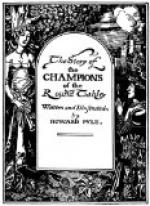But the King of Ireland said: “Let there not be war betwixt Ireland and Cornwall concerning this disagreement, but let us settle this affair in some other way. Let us each choose a champion and let those two champions decide the rights of this case by a combat at arms. For so the truth shall be made manifest.”
Now you are to know that at that time the knights of Cornwall were held in great disregard by all courts of chivalry; for there was not in those days any knight of repute in all the court of Cornwall. Wherefore King Mark knew not where he should find him a champion to meet that challenge from the King of Ireland. Yet he must needs meet it, for he was ashamed to refuse such a challenge as that, and so to acknowledge that Cornwall had no knight-champion to defend it. So he said it should be as the King of Ireland would have it, and that if the King of Ireland would choose a champion, he also would do the same.
[Sidenote: The King of Ireland chooses Sir Marhaus for his champion] Thereupon the King of Ireland chose for his champion Sir Marhaus of Ireland, who was one of the greatest knights in the world. For in the Book of King Arthur (which I wrote aforetime) you may there read in the story of Sir Pellias how great and puissant a champion Sir Marhaus was, and how he overthrew Sir Gawaine and others with the greatest ease. Wherefore at that time he was believed by many to be the greatest knight in the world (it being before the days of Sir Launcelot of the Lake), and even in the days of Sir Launcelot it was doubted whether he or Sir Launcelot were the greater champion.
So King Mark could not find any knight in Cornwall to stand against Sir Marhaus. Nor could he easily find any knight outside of Cornwall to do battle with him. For Sir Marhaus, being a knight of the Round Table, no other knight of the Round Table would fight against him—and there were no other knights so great as that famous brotherhood of the Table Round.
Accordingly, King Mark knew not where to turn to find him a champion to do battle in his behalf.
In this strait, King Mark sent a letter by a messenger to Lyonesse, asking if there was any knight at Lyonesse who would stand his champion against Sir Marhaus, and he offered great reward if such a champion would undertake his cause against Ireland.
[Sidenote: Tristram asks leave to go to Cornwall] Now when young Tristram heard this letter of his uncle King Mark, he straightway went to his father and said: “Sire, some whiles ago you desired that I should become a knight. Now I would that you would let me go to Cornwall upon this occasion. For when I come there I will beseech my uncle King Mark to make me a knight, and then I will go out against Sir Marhaus. For I have a great mind to undertake this adventure in behalf of King Mark, and to stand his champion against Sir Marhaus. For though Sir Marhaus is so great a knight and so famous a hero, yet if I should have the good fortune to overcome him in battle, there would, certes, be great glory to our house through my knighthood.”




